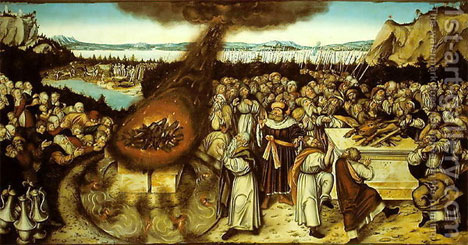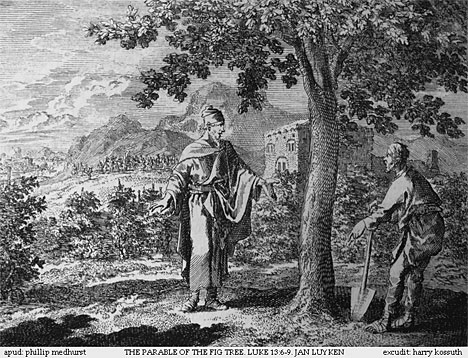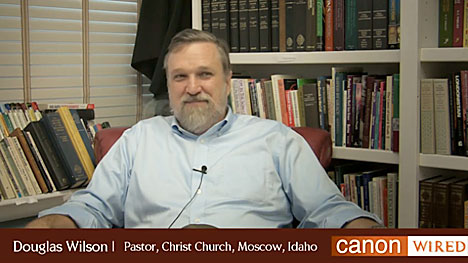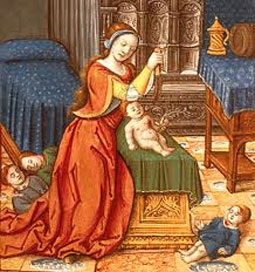Aug
12
2010

Does the Bible really contain everything the man of God requires? The curve balls of history call the church to greater and greater wisdom, but the principles remain the same. What if one of the oddest books of the Old Testament contained crucial advice for modern western culture and the Christians attempting to deal with its tragi-comic apostasy? Continue reading
1 comment | tags: Economics, Evolution, James Jordan, Judges, Worship | posted in Biblical Theology, Creation, Quotes
Aug
11
2010
The Art of Interpretation

Oh, the depth of the riches and wisdom and knowledge of God! How unsearchable are his judgments and how inscrutable his ways! (Romans 11:33)
Hermeneutics is a big word you learn at Bible College. It is the study or practice of interpreting texts in the areas of literature, law and religion.
In literature, discovering the intent of an author can be an enlightening game. In law, one’s life (or life sentence) can hang in the balance of a judge’s interpretation. In religion, besides plumbing the depths of the mind of God, it is an enlightening game in the balance of which many lives hang. God has revealed His mind in His Word, and has also seen fit to give to His people the often difficult job of interpreting it.
[This post has been refined and included in Sweet Counsel: Essays to Brighten the Eyes.]
Continue reading
Comments Off | tags: Ezekiel, Hermeneutics, John, Literary Structure, Revelation, Timothy, Typology, Warren Gage | posted in Biblical Theology
Aug
10
2010

Part 2 of the Bible Matrix interview on Trinity Talk is now available.
Continue reading
Comments Off | posted in Bible Matrix, Biblical Theology
Aug
9
2010
An Exhortation to Be A Fruitful Tree

Tabernacles was the final annual feast, a Godfest to be thrown by Jews as a ministry to Gentiles. At the Feast of Clouds [1], every household temporarily became a new house of God, a “local branch” of the Tabernacle, a “priesthood of all believers.” Of course, we see this fulfilled in the book of Acts. Just as we see Paul exhort the Ephesians (Gentiles!) to put on the mediatorial body-armour of the High Priest, [2] his final exhortation to the Roman Christians alludes to not only Israel’s feasts but Israel’s priesthood. Pretty much every church he established was a “booth” made of natural Jewish branches and ingrafted Gentile branches. [3] At Pentecost, the same cloud that received Jesus filled the house. [4] Now every household of faith was a Tabernacle, a glorious cloud with a government of human angel-elders. [5] In the Bible’s literary structure, a recurring motif at Tabernacles is good fruit, godly offspring. God wants more than just a covering of leaves. As in Eden, future generations hang upon wise government.
Continue reading
8 comments | tags: AD70, Add new tag, Atonement, Doug Wilson, Feasts, Genesis, Laver, Literary Structure, Paul, Roman Catholicism, Romans, Systematic typology, Tabernacles, Temple | posted in Bible Matrix, Biblical Theology, The Last Days
Aug
7
2010

Conspiracy theories sell books and DVDs. Anti-Christians love to dig up dung the church dealt with long ago, dung that didn’t stick, and reheat it. They present it as steaming hot, something freshly exposed that the church has previously succeeded in hiding away, for consumption by moderns desperate for reasons to ignore the Law of God. James Howells writes:
“…texts and history and science are regarded as great friends of the vast majority of us in Christianity, not perilous foes to be feared and silenced.
Continue reading
1 comment | posted in Apologetics, Quotes
Aug
6
2010

Here, Doug Wilson explains why the accusation that he is “mono-covenantal” is false.
It seems to me that if any distinction is to be made, it is not between pre- and postlapsarian history. The dichotomy Paul describes in Galatians is not between God’s Covenant with Adam and His Covenant in Christ, but between the Mosaic Covenant and the Adamic Covenant.
Continue reading
1 comment | tags: AD70, Covenant Theology, Galatians, Genesis, Paul, Postmillennialism, Revelation 20 | posted in Biblical Theology, The Last Days
Aug
4
2010
or Festivals from the Abyss

Herod, when he saw that he was deceived by the wise men, was exceedingly angry; and he sent forth and put to death all the male children who were in Bethlehem and in all its districts, from two years old and under, according to the time which he had determined from the wise men. Then was fulfilled what was spoken by Jeremiah the prophet, saying: “A voice was heard in Ramah, lamentation, weeping, and great mourning, Rachel weeping for her children, refusing to be comforted, because they are no more.” Matthew 2:16-18
Continuing from New Covenant Virility – 2
GLORIFICATION: (Tabernacles feast, marriage, children, rest)
Wow. This last bit really rubs in the kind of offspring (fruit) Israel gave God. It is the seventh stanza of this section, yet in itself it has seven stanzas. Each section submits itself to the common themes in Glorification, yet each section reiterates one step the sevenfold pattern. Tabernacles was the big feast, so in this final ascerbic prophecy, the prophet turns the annual Feasts into curses. [1] What sublime poetry is Isaiah.
Tabernacles is the Feasts of Booths. It is God’s people reaching maturity as a great tree and sheltering the nations. The cycle began with dry trees (eunuchs, etc.) being made fruitful. Here, God lays the ax to the root of the old tree.
Continue reading
1 comment | tags: Altar of the Abyss, Cyrus, Darius, Esther, Isaiah, Solomon, Tabernacles, Un-Passover | posted in Bible Matrix, Biblical Theology, The Restoration Era
Aug
4
2010
A. T. Ross gave Bible Matrix 4 out of 5 stars on goodreads.com:
Continue reading
Comments Off | tags: Adam Ross, Bible history | posted in Bible Matrix, Biblical Theology
Aug
4
2010
 .
.
Some more thoughts on New Covenant Virility.
The minute details of the Bible matter. What was the Ethiopian eunuch, keeper of the queen’s treasure, reading, and why? In sacred history there are no accidents.
Isaiah 53 is about the barrenness and woundedness of God’s Man. He is circumcision epitomised. Like a eunuch, He is judged by men as unfit for Tabernacle service, judged in the gates (kingdom doors shut) and sent outside the city. He is “stricken,” or afflicted with stroke, God’s “lash” of plague, as unacceptable-for-priesthood as a leper.
“…and who will declare His generation?” Here is an important detail. What does this mean?
Continue reading
Comments Off | tags: Abraham, Acts, Athaliah, Baptism, Haman, Isaiah, Literary Structure, Tabernacle, Temple | posted in Bible Matrix, Biblical Theology, The Restoration Era
Aug
3
2010

A lot of very smart Christians believe that the Creation account was written as a foil for Ancient Near Eastern creation myths. It was written by Moses to rally Israel culturally, to set a boundary between the Hebrew identity and that of the nations.
Continue reading
Comments Off | tags: Genesis, James Jordan, Literary Structure | posted in Bible Matrix, Biblical Theology, Creation, Quotes


































